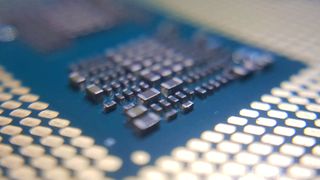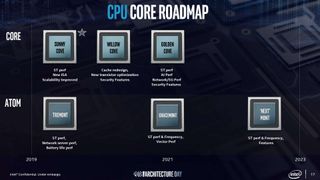Intel Rocket Lake CPUs confirmed to launch before March 31, 2021
Intel has given a sneak peak at the 11th Gen gaming processors, code-named Rocket Lake.

Intel has just confirmed that it's 11th Gen desktop processors, code-named Rocket Lake, will be launching into orbit in the first quarter of 2021. That means we'll get new Intel gaming CPUs before the end of March to take on the expected might of the new AMD Ryzen 5000-series processors being announced this week.

Amazon Prime Day 2020 deals: the place to find all the best Prime Day bargains around October 13 and 14.
So yeah, the timing of Intel's announcement, tacked onto the end of a Medium blog post by Intel's John Bonini is surely not coincidental for its publishing on the eve of a big AMD unveiling. Bonini is the head of Intel's Client Group Desktop, Workstation, and Gaming, and has one of the longer titles in the company.
The sneak peak at Rocket Lake also notes that it will be the first Intel desktop platform to support PCI Express 4.0 connectivity. While AMD's RX 5000-series graphics cards, and now Nvidia's RTX 30-series GPUs, support PCIe 4.0 it doesn't really make a huge difference to gaming performance. But having a platform which supports the new level in storage will be a big plus for Intel's next-gen gaming setups.
The blog post is titled: Intel’s Commitment to Gaming, and a Sneak Peek at Intel Technology to Come, and so Bonini specifically references Rocket Lake as a chip that will be "another fantastic processor for gaming".
But, aside from announcing the 11th Gen desktop release window and its PCIe 4.0 support, that's all the sneak peak says, though I would expect we'll hear more soon. Especially given how much the gaming CPU landscape could be about to change with the launch of the next-gen AMD Zen 3 processors.
Intel Rocket Lake is going to be another 14nm chip, but is expected to be launched with a different CPU Core architecture at its heart. Whether that's a backport of the 10nm Willow Cove or Sunny Cove designs we're still not entirely sure about, it might even be a hybrid of the two advanced architectures.

But either way, it should ensure an increase in terms of instructions-per-clock (IPC) compared with the current Comet Lake chips. That could well be key as the new Zen 3-based AMD Ryzen 5000-series CPUs are said to sport far higher IPC than the Zen 2 processors of the last generation… and that could mean the red team might overtake Intel's historic lead in gaming performance for the first time in a loooooong time.
The biggest gaming news, reviews and hardware deals
Keep up to date with the most important stories and the best deals, as picked by the PC Gamer team.
If you bought into the Comet Lake lineup recently, or had your hopes pinned on picking up an Intel CPU over Amazon Prime Day or Black Friday, then Rocket Lake might make you think again. Though it has to be said that the Z490 motherboard platform should be capable of supporting the 11th Gen Intel chips, and some even have pseudo PCIe 4.0 support baked into them too.
This announcement though may well give you second thoughts about picking up a Core i9 10900K or Core i7 10700K, even if the impending AMD Ryzen 5000-series hadn't already done that.
An early 2021 release of the Rocket Lake processors also would tie-in with the launch of the 10nm Alder Lake CPUs late next year too. Those are potentially more exciting processors, with Intel's first 16-core, 32-thread chips hitting the desktop with a revolutionary, controversial, and brave new architectural design.

Dave has been gaming since the days of Zaxxon and Lady Bug on the Colecovision, and code books for the Commodore Vic 20 (Death Race 2000!). He built his first gaming PC at the tender age of 16, and finally finished bug-fixing the Cyrix-based system around a year later. When he dropped it out of the window. He first started writing for Official PlayStation Magazine and Xbox World many decades ago, then moved onto PC Format full-time, then PC Gamer, TechRadar, and T3 among others. Now he's back, writing about the nightmarish graphics card market, CPUs with more cores than sense, gaming laptops hotter than the sun, and SSDs more capacious than a Cybertruck.
Most Popular







